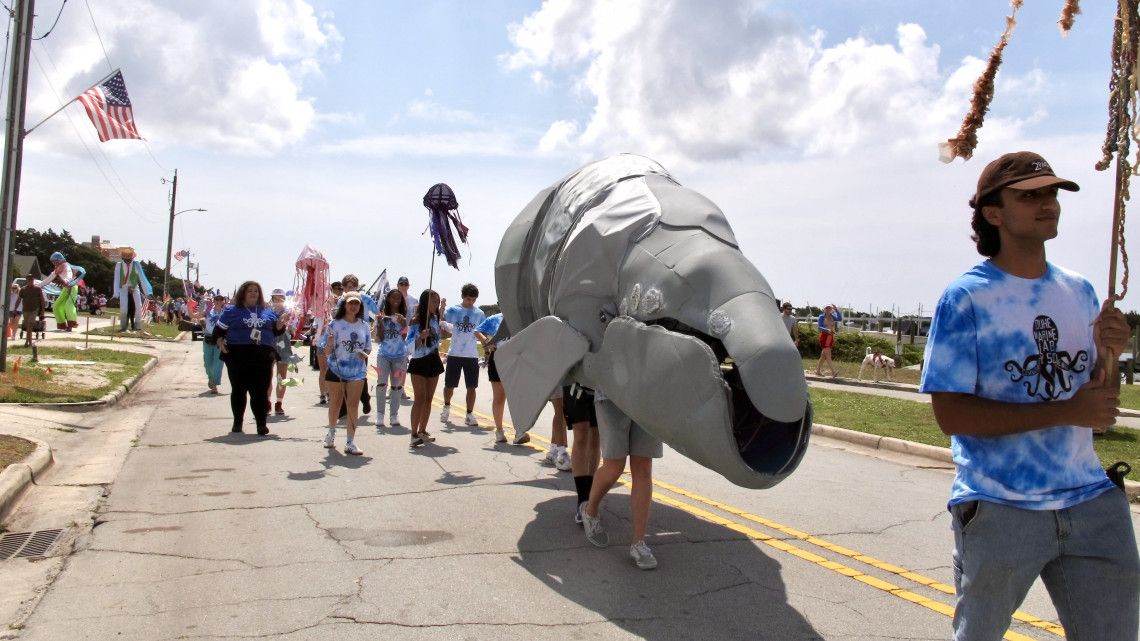
MFA in Dance Alum & Arts+ Residency
Fresh from the Outer Banks, sun-kissed, slightly sore yet fully inspired, Torry Bend is eager to continue the work started at Duke’s Marine Lab this summer. The professor of the practice in Theater Studies spent six weeks in Beaufort, North Carolina, directing Arts+ Resilience Through Puppetry and exploring the art form’s roles in teaching climate sustainability and community building.
Resilience Through Puppetry builds on Ready, Set, Resilience, a multidisciplinary curriculum created in partnership with Carteret County middle school educators. Part of the Bass Connections multi-year project Fostering Climate Resilience through Education and Arts, the Ready, Set, Resilience curriculum is spearheaded by Elizabeth “Liz” DeMattia, a research scientist at the Nicholas School of the Environment and director of the Duke Marine Lab’s Community Science Initiative.
Bend, also a team lead with the Bass Connection project, first connected with DeMattia several years earlier during a Duke Marine Lab visit. As part of a faculty working group on saltwater intrusion and sea level rise, the artist met the scientist, and the two found common ground in a shared interest of bringing science and the arts together to teach climate sustainability.
As the initial build out of the Ready, Set, Resilience curriculum began, DeMattia recognized that storytelling could be an important component for the project and extended an invitation to Bend. What began as a creative way to use puppets to build community quickly became a powerful tool for helping students practice core components of resilience such as self-regulation, creativity and connection with the environment. The activities in the Ready, Set, Resilience curriculum incorporate breathing exercises and embodied practices to support emotional regulation and reflection, and puppetry brought it all together in an accessible way.
“The puppetry became a creative and engaging method for breathing life into inanimate objects and fostering empathy to help students form meaningful connections to nature and to one another,” Bend reflects. “It just all fit together so beautifully.”
It takes a village
That beautiful fit accompanied Bend to the coast this summer, where the Beaufort community embraced the Arts+ team: Bend, three undergraduates — Ally Doss (Theater Studies and Computer Science), Jocelyn Morgenstein (Environmental Science and Policy) and Naflah Mohammed (Biology and Cultural Anthropology) — and MFA in Dance alum em liptow. The five worked closely with local experts to fabricate a parade puppet for the town’s annual Independence Day parade. For inspiration, all they had to do was look up.
“We decided on the endangered North Atlantic right whale, which is on the town’s flag,” Bend shares. “Because right whales are a familiar sight to the folks who live in Beaufort, they’ve been fully embraced by the community.”
Modeling their parade puppet on Granite, a very real right whale spotted frequently off the North Carolina coast, Bend was also moved by how fully her team was embraced by Beaufort. Keith Rittmaster with the Bonehenge Whale Center brought in right whale expert Renee LaGarenne with the Clearwater Marine Aquarium to ensure Granite’s homage was as accurate as possible, from the position of her blowhole to the placement of her callosities (the patches of raised tissue on her head). And artists Vic and Laura Fasolino offered their expertise with creating parade puppets, as well as the use of their workshop.
“The community was deeply invested in the authenticity of the whale puppet, taking time to visit the workshop and offer thoughtful feedback,” Bend shares. “What began as this artistic gesture quickly became a portrait that captured Granite’s spirit, and we connected with one another while honoring both the artistic and the scientific integrity.”
Ready, set, fall semester
Bend will build on the work done over the summer and “lean heavily” into the puppetry component of the Ready, Set, Resilience curriculum, which has now expanded into the Durham County school system. She sees it as an opportunity to connect Duke students who are taking part in the 2025-2026 Bass Connections project with Durham educators. Focusing on creating additional parade puppets for local community events and supporting Durham teachers and students in the classroom, the Bass Connection students will have access to not only Bend’s puppet studio on campus but also to her research and experience to share what they learn with the greater community.
“For example, if we have a teacher who really wants to incorporate shadow puppetry in the Ready, Set, Resilience curriculum, we’ll have the ability to provide tailored materials to meet that educator’s classroom needs,” explains Bend.
As she also explores ways to incorporates the experiences built this summer in Beaufort, what stands out most to Bend is how far the classroom work focusing on climate resilience can ripple outward. Puppetry has led to new ways of inviting neighbors, families and local leaders into conversations about our climate and resiliency. It’s not just arts integration — it’s community integration.
“What this curriculum introduces in our schools can definitely become a bridge into the larger community, beginning a shared narrative of climate change and sustainability,” Bend reflects. “Art can give students a voice that reverberates into their communities, inviting all of us to the conversation.”







